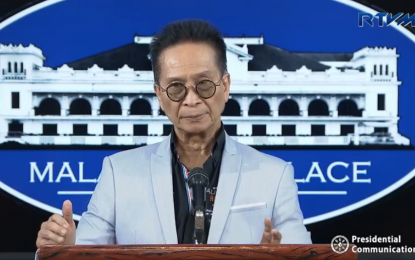
MANILA – Chief Presidential Legal Counsel Salvador Panelo on Sunday hailed the political will of President Rodrigo Duterte in signing the anti-terrorism law despite pressure from external forces.
In a statement, Panelo said the President decided to sign the controversial bill into law to preserve national security and promote the general welfare of the Filipinos.
“Consistent with his character, the President did not give in to the pressure of external forces, such as United Nations (UN) High Commissioner for Human Rights Michelle Bachelet, who were asking him not to sign the measure into law,” he said.
During the 44th regular session of the UN Human Rights Council (UNHRC) on June 30, Bachelet urged the President to “refrain” from signing the measure, saying its passage could intensify concerns on the “blurring of important distinctions between criticism, criminality, and terrorism.”
Panelo defended the measure, saying it will “provide the government the legal weapon to ensnare the terrorists at their trail even before they can launch their ruthless and savage attacks”.
“The signing by President Rodrigo Roa Duterte of Republic Act 11479, otherwise known as Anti-Terrorism Act of 2020 (ATA), heralds a new dawn in the country’s fight against the ruthless global crime against humanity: terrorism,” he said.
Panelo also slammed retired Supreme Court Senior Associate Justice Antonio Carpio for saying several provisions of the law, particularly Section 4 “vaguely” defines terrorism.
He, however, insisted that Section 4 gives a “precise definition of terrorism by providing an exclusive enumeration of terroristic acts for the education of government enforcement agents.
“They are put on notice that all actions not identified therein cannot be classified as terrorism. ‘Expressio unius est exclusio alterius.’ What the law does not include, it excludes,” he said.
Panelo said Section 4 explicitly states that terrorism does not include “advocacy, protest, dissent, stoppage of work, industrial or mass action, and other similar exercises of civil and political rights, which are not intended to cause death or serious physical harm to a person, to endanger a person’s life, or to create a serious risk to public safety.”
Further, he said the anti-terrorism law contains safeguards against violations of political and civil rights, as guaranteed by the Constitution, and as promoted by public international law.
Panelo said the President himself will ensure that there will be no abuses in its enforcement.
The Anti-Terrorism Act of 2020 or RA 11479, which was signed by the President on Friday, aims to protect lives, liberty and properties from acts of terrorism.
Acts intended to cause death or serious injury to any person, extensive damage to a government facility, and extensive interference with destruction to critical infrastructure are considered as terror acts, the law reads.
A 12-year imprisonment will be meted on any person who threatens to commit any of the terror acts mentioned in the law.
Under the law, people who are part of the planning and training for the commission of terrorism will face life imprisonment without parole and other benefits. (PNA)
